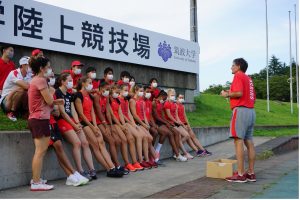2021.10.05
Report on the Swiss Team Pre-Camp for the Tokyo 2020 Olympic Games
The Office for the Promotion of Olympic and Paralympic Activities (OPOP) supported the Swiss National Team’s pre-camp for the Tokyo 2020 Olympic Games (Tokyo 2020 Games) from Wednesday July 14 to Monday August 2, 2021.
This pre-camp required an unprecedented “safe and secure response” to ensure that no university staff or members of the Swiss Team were infected with Covid-19. Luckily this was the case, and the Swiss athletes could compete in the Olympic Games. This report outlines the pre-camp support given by OPOP in cooperation with Tsukuba City and Ibaraki Prefecture, impressions of student support staff, and the significance of the invitation by the University of Tsukuba to the Swiss Olympic Association to host this international pre-camp.
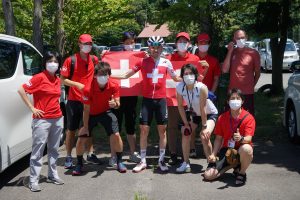
1.Background
It was officially decided in April 2018 that the University of Tsukuba, Tsukuba City, and Ibaraki Prefecture would host the Swiss National Team’s pre-camp for the Tokyo 2020 Games. In this way, OPOP could leverage its experience in hosting other Swiss Team pre-camps for the World Triathlon at Yokohama City and World Athletics (Relay) event in Tokyo in 2019.
The pre-camp for the Tokyo 2020 Games included mountain biking (MTB), Judo, and Athletics, with a total of 52 participants, including athletes, coaches, and trainers. Thirty support staff were recruited in advance, mainly from students of the Joint Master’s Program in International Development and Peace through Sport (IDS), Tsukuba International Academy for Sport Studies (TIAS 2.0), School of Physical Education, Health & Sport Sciences and College of International Studies. Students from Athletics, Judo and Gymnastics teams also lent their support.
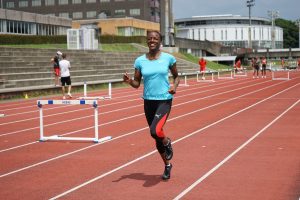
2. Preparation for the pre-camp
The guidelines for thorough infection control measures were the “Tokyo Olympic and Paralympic Games Acceptance Manual for Swiss Team (Pre-Camp)” (1st edition, June 28, 2021), which was formulated based on the Cabinet Secretariat’s Pre-Camp Acceptance Manual and the University’s internal guidelines (decided by the President on April 8, 2021). One of the most complicated parts of the plan was “zoning” of the space to be used to avoid close contact between the Swiss Team and general university students and staff.
For example, the training gym, restroom, and parking lot were used exclusively by the Swiss Team. The route from the parking lot to each training facility was determined and Swiss athletes were always accompanied by support staff. Since the on-campus loop and the athletic field were to be shared areas and not for the exclusive of the Swiss Team, simulations were created to predict how each environment could be used, mitigate close contact and establish support/attendance methods.
A lecture on infection control was given to support staff by a nurse from the University of Tsukuba Hospital. Attending staff were required to take a PCR test every day or every seven days, depending on the degree of contact with the Swiss Team. They were also asked to record their daily activities 14 days prior to the first day of attendance. This was in case of positive PCR test or becoming a close contact person of COVID-19.
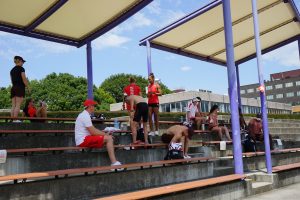
Measures against heat, earthquakes, injuries, and other emergencies were also prepared. An air-conditioned room next to the athletic stadium was set-up for the Swiss athletes. A shaded secondary athletics track was also prepared. An evacuation route in case of an earthquake was also discussed with the Office of Occupational Health and Safety Management, University of Tsukuba. Measures in case of injury by the Swiss athletes were also considered and were planned by the University of Tsukuba Hospital. In addition, the actions to be taken in case of a positive PCR test was prepared through discussions between the Tsukuba Medical Centre Foundation, University of Tsukuba Hospital, Tsukuba Health Center, Tsukuba City, and Ibaraki Prefecture.
In relation to food preparation, two Swiss chefs came to Japan and, foods were brought to the hotel every day from a designated company. If any other foods were necessary, support staff and hotel responded to the chefs’ requests.
3. Pre-camp support
Flexibility was often needed by support staff.
The training menu for MTB was decided after the previous day’s practice. The MTB athlete, needed to judge his body condition before deciding the next day’s training schedule. Infection measures and training locations were submitted in advance to the Cabinet Secretariat. It was necessary to discuss with the MTB athlete, coaches and OPOP staff daily and decide the training location. He rode his bicycle for more than three hours around
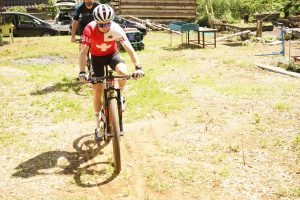
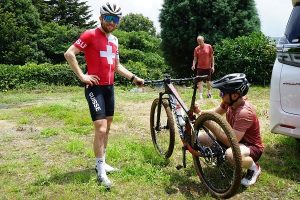
Mt. Tsukuba and did 10 laps around the on-campus loop. Around ten staff worked on his safety by sharing his location via radio telephones and smart phones.
He used social media, which has 600,000 followers, to introduce his training during the pre-camp. At the Olympics he won the silver medal. From this output and result, it was assumed that this pre-games practices on and off-campus were beneficial.
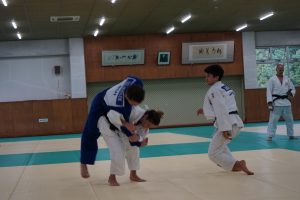
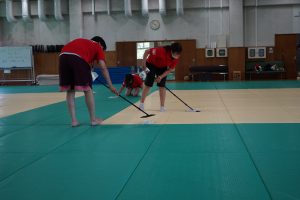
The Swiss Judo Team mainly used the Dojo on the second floor of the Budo-kan at the University of Tsukuba. To prevent clusters among the team, the windows were kept open and the air-conditioning kept on during practice. Before and after the practices, the entire tatami mat was swept and wiped with disinfectant sheets. A steady disinfecting process was done by at least four support staff despite being in an air-conditioned room conditions were still sweaty.
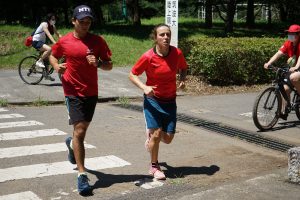
The Judo athletes saw the support staff working and always expressed their gratitude. The athlete who competed in the bronze medal match at the Tokyo 2020 Games sent messages to a support staff member by SNS after the match.
There were times when the Swiss athletes trained in the stadium at the same time with university student athletes. For this reason, support staff were placed in at least four locations in the stadium each time, communicating by radio telephone to avoid contact between the groups. The university students had a shared understanding of the priority use of the facilities by the Swiss Team, so they kept their distance.
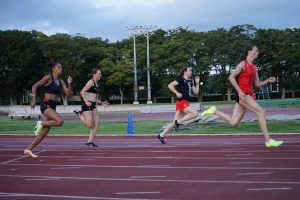
Other infection measures were also implemented. When the Swiss high jumpers practiced, they used a different landing mat than the one used by the students. At least two support staff accompanied the middle and long-distance runners by bicycles when they ran on the on-campus loop. The staff kept the public at a distance of at least 2 meters from the athletes while monitoring their safety. On the last day, the Swiss Team gave umbrellas to all the staff.
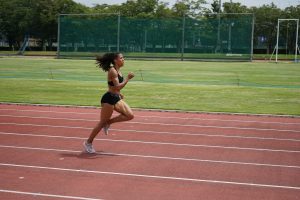
4. Impressions of student support staff
The following are some of the support staff reports about the pre-camp. The impressions show that the staff experienced personal growth through supporting the Swiss athlete’s Olympic Games preparation.
■First-year student, Master’s Program in Physical Education, Health and Sport Sciences
I feel that I have gained a lot by completing my job as a support staff for the Swiss Team. (omission) During the first week of assisting with the MTB training, it was difficult for me to become a core support person. Although I wanted to talk to the riders more and participate in the discussions about the training course, I felt that I was not good enough. I was just standing beside the course and kept his safety. (omission) In the latter half of the schedule, when the Athletic team came in, I was entrusted with the job of leading the athletes when they ran the on-campus loop. It was a very valuable experience for me. During these three weeks, I could realize the importance of “reporting, communication, and consultation.” I could also understand that I would be entrusted with important work if I did my work properly. I also felt happy to work in a situation where unusual things could happen and cope well with these changing circumstances.
■Third-year student, School of Physical Education, Health and Sport Sciences
There are two things that I realized after finishing my Swiss Team support. One is that “supporting sports” provides incentive in my life. (omission) Each task, such as communicating with athletes and coaches in English and responding to their requests, was fresh and challenging, and when the Swiss Team thanked me, I felt happy. (omission) Secondly, I was able to find a new value in the Olympics. Through my interactions with the athletes and coaches, I grew fond of the country and its people, and naturally cheered for the Swiss athletes whenever I found them in any Olympic event. (omission) I am grateful for this experience, and I would like to use this experience as an incentive in my studies and actions so that I can contribute to the Paris 2024 Olympic Games and other competitions.
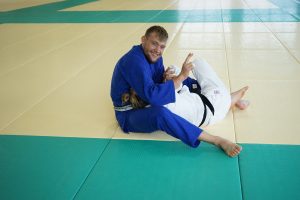
■Sophomore, School of Physical Education, Health and Sport Sciences
I like English, but I had no practical experience of working in English. I was very worried about whether I could communicate well with the Swiss Team. However, my worries disappeared when I started working as support staff. I was able to communicate with them, and it turned out to be a very fulfilling experience. (omission) In addition, this experience had another great meaning for me. It was a chance to meet other staff. I entered university the same year that Covid-19 infection began to spread, so I had spent the last 18 months without feeling like I was a university student, as I rarely took classes at the university and could not make new friends. However, through this experience, I was able to meet people from various clubs. I learnt a lot about the world that I didn’t previously know.
■Senior, School of Physical Education, Health and Sport Sciences
I could not improve my language skills through the support work. However, I was able to acquire an attitude of communicating without fear of failure. This is something that I could not have learned from my previous language studies. In the future, there will be situations in which I need to communicate in English. At that time, I will have the stance that even if I cannot convey what I want to say in beautiful English, I will try to convey it somehow, even via gestures. This experience has made me want to improve my language skills.
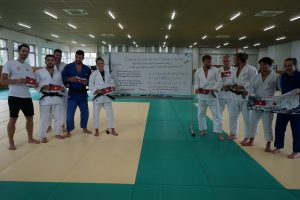
■Senior, College of International Studies
As support staff, there were many things that I had to take care of because of the coronavirus. For example, I had to stay with the athletes no matter how many were running to prevent anyone from getting infected. We also had to always disinfect everywhere and wear masks, even in the heat. This was on top of the fact that the athletes were just making their final adjustments before the most significant competition and needed to be flexible. However, I was very proud to see the players practicing well, and it was very rewarding to hear them say “Thank you” to me even I could only speak a little English.
■First-year student, Master’s Program in Physical Education, Health and Sport Sciences
I became interested in being support staff for the Swiss Team because I wanted to have good memories of the Tokyo 2020 Games. Due to COVID-19, I had been forced to live a restricted life for almost 18 months, and I thought that if I didn’t do anything, my memories of the Tokyo 2020 Games would be replaced by the image of this restricting life. (omission) When I saw the athletes practicing and adjusting for the Games, I honestly felt that I was lucky to be involved in the Olympics, where athletes from all over the world present compete and where various events are held at the same time. The athletes were friendly and warmed my heart, even though I had to take care of infection control.
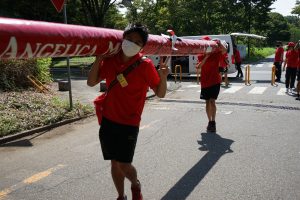
5. Summary
It was a “tough” pre-camp because both the Swiss Team and the support staff had to cope with the heat while taking measures against infection. Despite this, we could get through the camp as one-team, which led to the athletes’ best performance in the Tokyo 2020 Games. For example, the MTB athlete won a silver medal, a Judo athlete advanced to the bronze medal match, and a Swiss record was set in the women’s 100 meters (6th place). After the pre-camp, we received the following message from the head of the Swiss Team.
“The time with you guys was really fantastic. Your hospitality, helpfulness and friendliness have impressed me very much. I still don’t know how you managed the three weeks with us. (omission) Thank you again for everything you have given us and made! I will never forget Tsukuba!”
On the other hand, it was a pity that other university students and local residents were not able to interact with the Swiss Team. At a joint press conference held online during the pre-camp, one of the athletes said, “I would have liked to interact more with the local residents and explore Tsukuba City.” A faculty member from the university also said, “I could not even watch the Swiss athletes practice due to strict infection control.”
However, from the student support staff reports, it was clear that they had received positive stimulation from the Swiss Team. It was also clear that the experience of interacting with the team, even if only for a short time, led to future aspirations to be involved in the next Olympics or Paralympics. We hope that the students will utilize this experience in the future and that they will be able to give back in various ways for the development of our university, the local community, Japan, and the world.
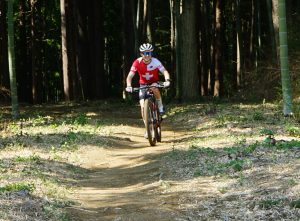
As for the University of Tsukuba, our relationship with Switzerland has been strengthened, and we obtained results that will be useful in the future. In addition, by continuously creating opportunities to be an international campsite, our university will become a base for the development and guidance of human resources who will be active on the international sports stage.
For the Tokyo 2020 Games, in addition to TIAS, which has produced a large number of graduates, it is expected that the University of Tsukuba will develop further initiatives, such as the formation of an international camp base as a result of the experiences described above.
We would like to express our gratitude to Tsukuba City, the host town, and the people in charge at Ibaraki Prefecture for their cooperation in hosting the Swiss delegation.
